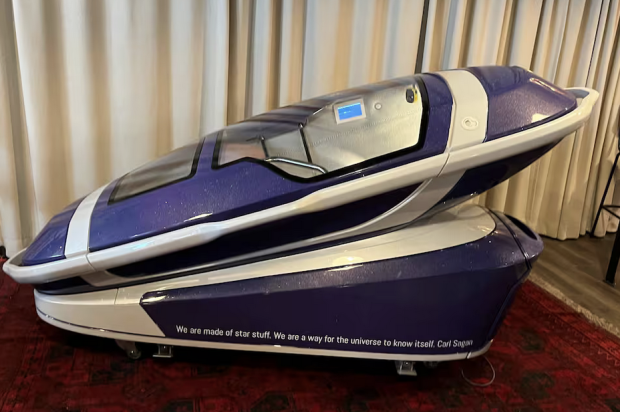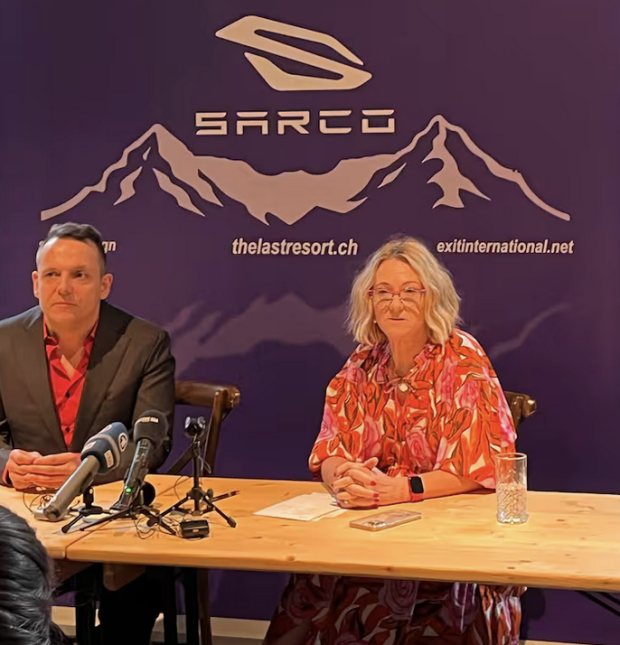July 21, 2024
“Press Button To Die” Switzerland To Soon Use Portable Suicide Pods
The person wishing to die must first pass a psychiatric assessment of their mental capacity.
Zurich, Switzerland
An assisted dying group expects a portable suicide pod to be used for the first time in Switzerland, potentially within months, providing death without medical supervision, it said Wednesday.
The space-age-looking Sarco capsule, first unveiled in 2019, replaces the oxygen inside it with nitrogen, causing death by hypoxia. It would cost $20 to use.
The Last Resort organisation said it saw no legal obstacle to its use in Switzerland, where the law generally allows assisted suicide if the person commits the lethal act themselves.
“Since we have people indeed queueing up, asking to use the Sarco, it’s very likely that it will take place pretty soon,” The Last Resort’s chief executive Florian Willet told a press conference.
“I cannot imagine a more beautiful way (to die), of breathing air without oxygen until falling into an eternal sleep,” he added.

‘Press this button’ to die
The person wishing to die must first pass a psychiatric assessment of their mental capacity — a key legal requirement.
The person climbs into the purple capsule, closes the lid, and is asked automated questions such as who they are, where they are and if they know what happens when they press the button.
“‘If you want to die’, the voice says in the processor, ‘Press this button’,” said Sarco inventor Philip Nitschke, a leading global figure in right-to-die activism.
He explained that once the button is pressed, the amount of oxygen in the air plummets from 21 per cent to 0.05 per cent in less than 30 seconds.
“Within two breaths of air of that low level of oxygen, they will start to feel disorientated, uncoordinated and slightly euphoric before losing consciousness,” Nitschke said.
“They will then stay in that state of unconsciousness for… around about five minutes before death will take place,” he added.
The Sarco monitors the oxygen level in the capsule, the person’s heart rate and the oxygen saturation of the blood.
“We will be able to see quite quickly when that person has died,” said Nitschke.
As for someone changing their mind at the very last minute, Nitschke said: “Once you press that button, there’s no way of going back.”
First user
No decision has been made over the date and location of the first death, or who the first user might be.
Such details would not be made public until after the event.
“We really don’t want a person’s desire for a peaceful passing Switzerland to turn into a media circus,” said lawyer Fiona Stewart, who is on The Last Resort’s advisory board.
She said it would be used “in a very secluded location, in the beauty of nature”, though it had to be on private property.

Asked if the first use would be this year, she replied: “I would say yes.”
The minimum age limit is set at 50, though if someone over 18 was seriously ill, “we would not want to deny a suffering person based on their age”, said Stewart.
The capsule can be reused
Nitschke’s Exit International organisation, which owns the Sarco, is a non-profit group funded by donations.
Stewart said the only cost for the user would be 18 Swiss francs ($20) for the nitrogen.
Development and debate
The capsule’s potential use has raised a host of legal and ethical questions in Switzerland, reigniting debate on assisted dying.
The Wallis cantonal doctor has banned its use, while other cantons have voiced reservations.
“It’s our understanding that there’s no legal impediment to the Sarco being used… despite what any canton says,” Stewart insisted.
Nitrogen, which forms 78 per cent of the air, is “not a medical product… it’s not a dangerous weapon”, she added.
“We’re looking to de-medicalise assisted suicide because a Sarco doesn’t require a doctor to be in close proximity,” said Stewart.
Only once a person has died would the Swiss authorities be called.
The 3D-printable capsule cost more than 650,000 euros ($710,000) to research and develop in the Netherlands over 12 years.
Stewart said it had been tested with instruments in a workshop in Rotterdam over the last 12 months. It has not been tested on humans or animals.
The current Sarco could only accommodate someone five feet and eight inches (1.73 metres) tall. The development team is seeking to build a double Sarco so couples could end their lives together.
Future Sarcos could cost around 15,000 euros.
The Sarco will never be permitted for use in capital punishment, said The Last Resort.